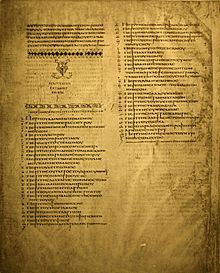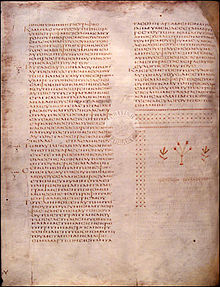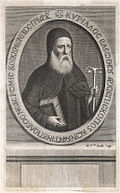- Codex Alexandrinus
-
Manuscrits du Nouveau Testament
Papyri • Onciale • Minuscules • LectionnaireOnciale 02 nom Codex Alexandrinus texte Nouveau Testament † langue Grec ancien date Ve siècle maintenant à British Library dimension 37 x 32 cm type Texte byzantin/Texte alexandrin Catégorie III/I Le Codex Alexandrinus (Gregory-Aland no. A 02) est un manuscrit en grand oncial presque complet de la Septante et du Nouveau Testament datant du Ve siècle. Le codex tire son nom de la ville de Alexandria. Au même titre que le Codex Sinaïticus ou le Codex vaticanus, il s'agit d'une des plus anciennes et des plus complètes copies de la Bible grecque[1].
Sommaire
Contenu
Ecrit en onciales avec deux colonnes sur chaque page, chaque colonne contient entre 46 et 52 lignes et chaque ligne entre 20 et 25 lettres[1]. L'encre rouge est utilisée pour le début de chaque ligne. Toutes les sections commencent par une lettre de grande dimension située dans la marge.
On dénombre 773 feuillets en vélin (630 pour l'Ancien Testament et 143 pour le Nouveau Testament)[1].
Il utilise fréquemment des Nomina sacra.
Sur la première page se trouvent écrits en arabe ces mots : « Écrit par Thekla, le martyr. Il manque Matthieu 1 à 25 et Jean 6 v. 50 à 8 v. 52 ». Trois feuilles manquent également dans la deuxième épître aux Corinthiens.
Pour les évangiles, au début de chaque livre figure une table de titres ou sommaires numérotés représentant un système de division datant de la fin du IVe siècle : c'est le plus ancien témoin de ce système, qui semble d'origine antiochienne. Chaque titre ou sommaire est ensuite repris en haut de la page correspondante.
Romains 2,5 – αποκαλυψεως ] ανταποδοσεως[2]
Éphésiens 1,7 χαριτος ] χρηστοτητος – Α 365 copbo[3].
Éphésiens 4,14 της πλανης ] του διαβολου[4].
Hébreux 13,21 παντι αγαθω ] παντι εργω και λογω αγαθω[5].
Histoire
Le codex tire son nom de la ville d'Alexandrie où l'on suppose qu'il fut rédigé. On cite également la Palestine.
Propriété du Patriarche d'Alexandrie depuis 1098, il a été donné à Charles Ier d'Angleterre, en 1628, par Cyrille Lucar, patriarche de Constantinople. Il est toujours propriété de la famille royale d'Angleterre.
Le Codex Alexandrinus est actuellement conservé à la British Library de Londres[1].
Importance du codex
Il est le premier des trois grands manuscrits onciaux à avoir été révélé au grand public. Ses variantes figurent ainsi les premières en dessous du texte grec, dans la Bible polyglotte éditée par Brian Walton à Londres (1654-1657). Et même si la qualité de son texte n'égale pas celle des deux autres (cf Codex Vaticanus et Codex Sinaïticus), il sera à l'origine d'une nouvelle ère de recherche textuelle biblique.
Voir aussi
Articles connexes
Notes et références
- Kurt & Barbara Aland, Der Text des Neuen Testaments, Deutsche Bibelgesellschaft, Stuttgart, 1991, ISBN 3-438-06011-6, S. 118.
- Eberhard Nestle, Erwin Nestle, Barbara Aland and Kurt Aland (eds), Novum Testamentum Graece, 26th edition, (Stuttgart: Deutsche Bibelgesellschaft, 1983), p. 411.
- Eberhard Nestle, Erwin Nestle, Barbara Aland and Kurt Aland (eds), Novum Testamentum Graece, 26th edition, (Stuttgart: Deutsche Bibelgesellschaft, 1991), p. 504.
- Eberhard Nestle, Erwin Nestle, Barbara Aland and Kurt Aland (eds), Novum Testamentum Graece, 26th edition, (Stuttgart: Deutsche Bibelgesellschaft, 1991), p. 509.
- The Greek New Testament, ed. K. Aland, A. Black, C. M. Martini, B. M. Metzger, and A. Wikgren, in cooperation with INTF, United Bible Societies, 3rd edition, (Stuttgart 1983), p. 778.
Liens externes
- Codex Alexandrinus a la CSNTM
- Encyclopédie catholique en anglais (très documentée)
- Kirsopp Lake, Family Π and the Codex Alexandrinus. The Text According to Mark, London 1936
Bibliographie
- Burkitt, F. C., Codex Alexandrinus, JTS XI (Oxford, 1909-1910), pp. 663–666.
- (en) Frederick G. Kenyon, Our Bible and the Ancient Manuscripts, British Museum, 1939, 4the éd. [lire en ligne], p. 128–132
- Calkins, Robert G., Illuminated Books of the Middle Ages. Ithaca, New York, Cornell University Press, 1983.
- Hernández, Juan, Scribal Habits and Theological Influences in the Apocalypse, The Singular Readings of Sinaiticus, Alexandrinus, and Ephraemi, Tübingen, Mohr Siebeck, 2006.
- Mc Kendrick, S., « The Codex Alexandrinus : Or the dangers of being a named manuscript », in S. Mc Kendrick & O. A. O'Sullivan, The Bible as a Book : The Transmission of the Greek text, London, 2003.
Wikimedia Foundation. 2010.



